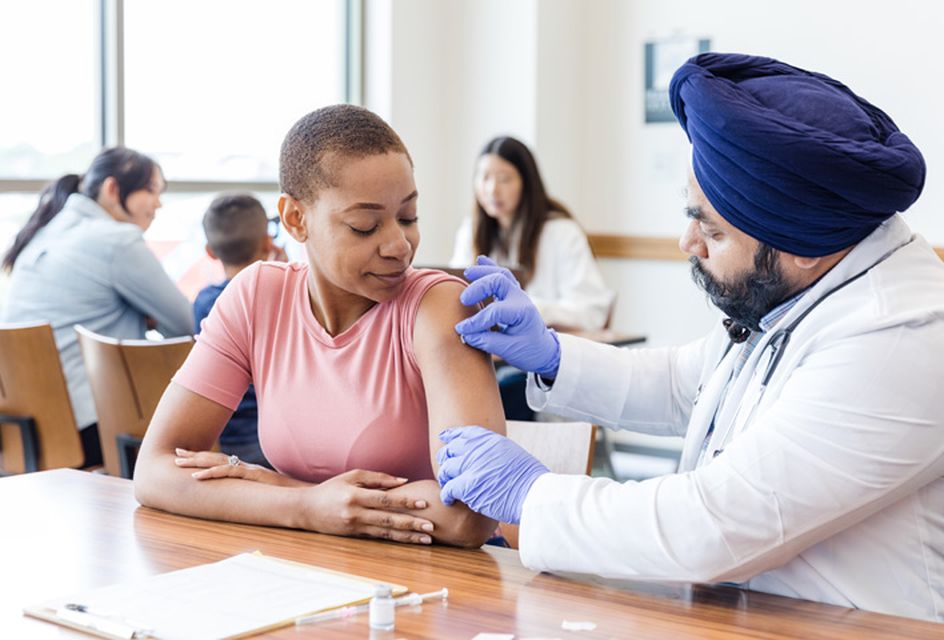Moving the needle: How to increase vaccine uptake
Vaccinations play an important role in keeping us healthy from early childhood to working-age adulthood and later life. This report explores how to encourage vaccination uptake and address misinformation.

Vaccines are one of the most successful public health interventions in history.
As the UK population ages, they become increasingly important to us throughout our life course, not just in childhood. Several vaccinations are now offered to older adults and the working population.
Bearing this in mind, Moving the Needle explores attitudes and awareness of vaccinations that parents, healthcare professionals and adults have, exploring their thoughts and views about immunisations given in our early years to those provided to older people.
Moving the Needle: at a glance
Key findings
- 49% of parents reported that the timings of appointments were a barrier to vaccinations. 46% mentioned that the availability of appointments was also an issue
- Over 30% of adults were worried about the costs associated with getting a vaccine
- 34% of older adults agree that the main barrier for them to access vaccinations is getting an appointment
Recommendations
- Offer vaccines in different locations, including places on the high streets.
- Send reminders about vaccinations using innovative methods, helping people not to forget when they are having their vaccines.
- Use programmes like Making Every Contact Count so that healthcare professionals and the wider public health workforce can better support those eligible for vaccines.
Key statistics
of working-age adults think that the availability of appointments hinders their access to vaccines
parents say the timings of appointments are a barrier for them to access vaccinations
of older adults think that the location of appointments is a problem
What are the barriers to vaccine uptake?
Timing of appointments
RSPH research shows that people from all ages and courses of life think the timing of appointments is barrier for them to access vaccinations. Parents who work or people with busy schedules find it challenging to book vaccine appointments at a time that works for them. To overcome this barrier, vaccines should be offered more flexibly.
Availability of appointments
Parents, working people and older adults told the RSPH that the availability of appointments was an issue for them. The difficulty in finding an appointment meant that people could not access their vaccines at the right time.
Location of appointments
Location of appointments is a key barrier to vaccine uptake, particularly for working-age and older adults. Having the appointments closer to where people live or work or offering the vaccine in places where they already go, such as pharmacies, more accessible places or even the workplace itself, can remove this barrier and potentially increase vaccine uptake.
Lack of reminders
People are more likely to forget about appointments booked too far in the future. Reminders, such as SMS messages or phone calls, could help people remember they have an appointment booked.
Costs of attending appointments
To some people, attending vaccine appointments can be an expensive task. Cost of transportation, childcare or even not getting paid for time taken off work to attend the appointment can turn them into an unaffordable undertaking. Ensuring appointments are offered at flexible timings and in places convenient to people can help them overcome this barrier.
How to encourage vaccine uptake
Effective communication about the benefits of vaccination
People told the RSPH that vaccination side effects are a genuine concern for them. Effective communication about the benefits of vaccinations, sharing how they protect us from potentially deadly diseases, while accommodating people’s questions, can ensure they feel supported.
Ensure vaccine appointments are flexible
People from different ages told the RSPH that the timing, availability and location of vaccine appointments very often do not work for them. Offering vaccines in times and places that work for parents, working-age adults and older people can make appointments more accessible for them.
Make Every Contact Count (MECC) for vaccines
Healthcare professionals and the wider public health workforce are well-suited to have conversations with parents, working-age adults and older people about vaccinations. However, we need to ensure that they are equipped with the necessary tools to have these conversations. Initiatives such as MECC can help them acquire the skills they need to best support people from all walks of life with their vaccination queries, consequently helping uptake increase.






